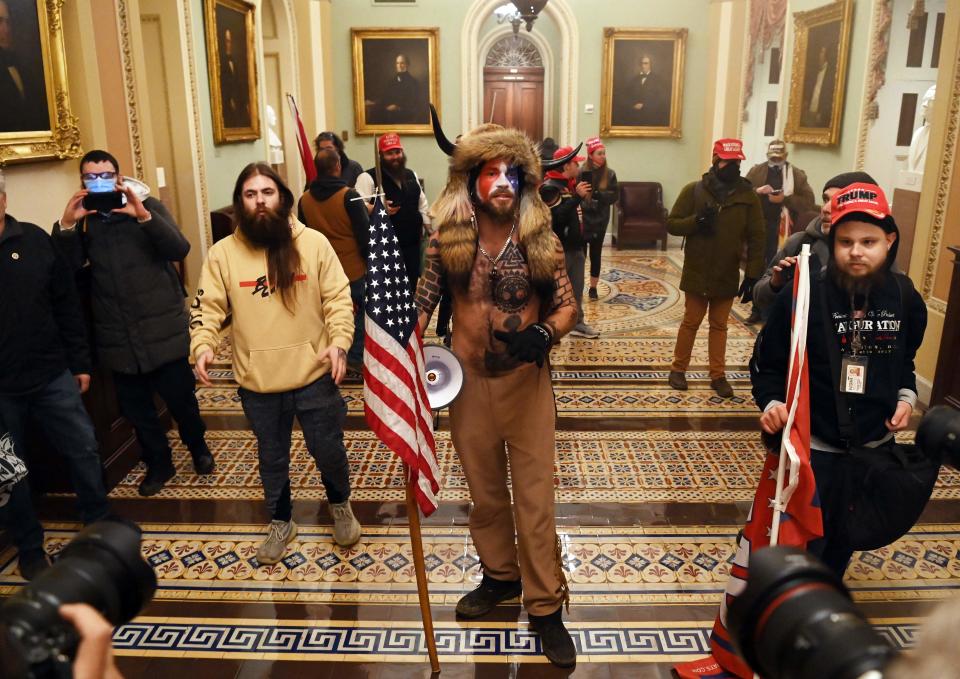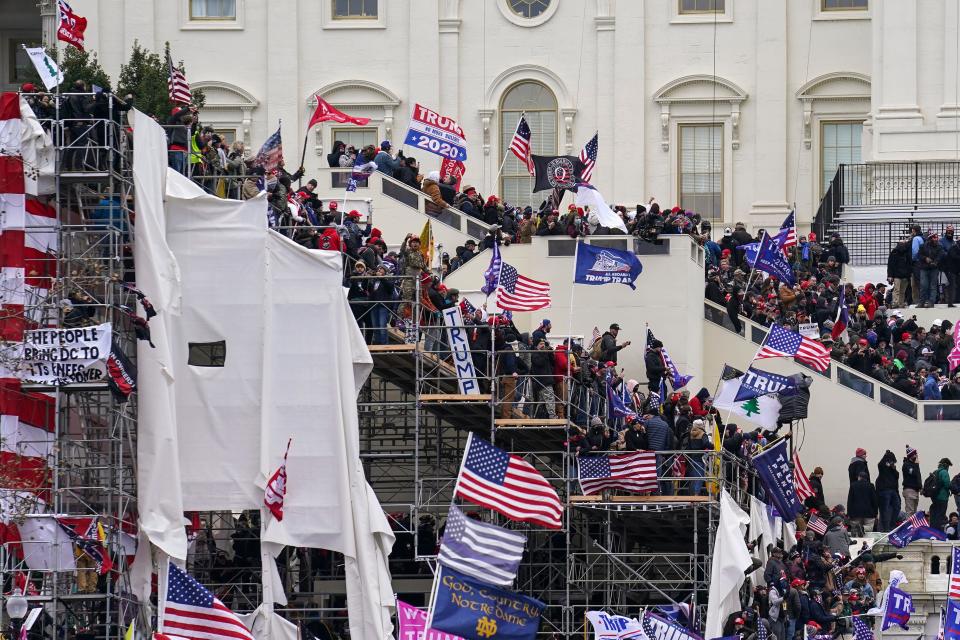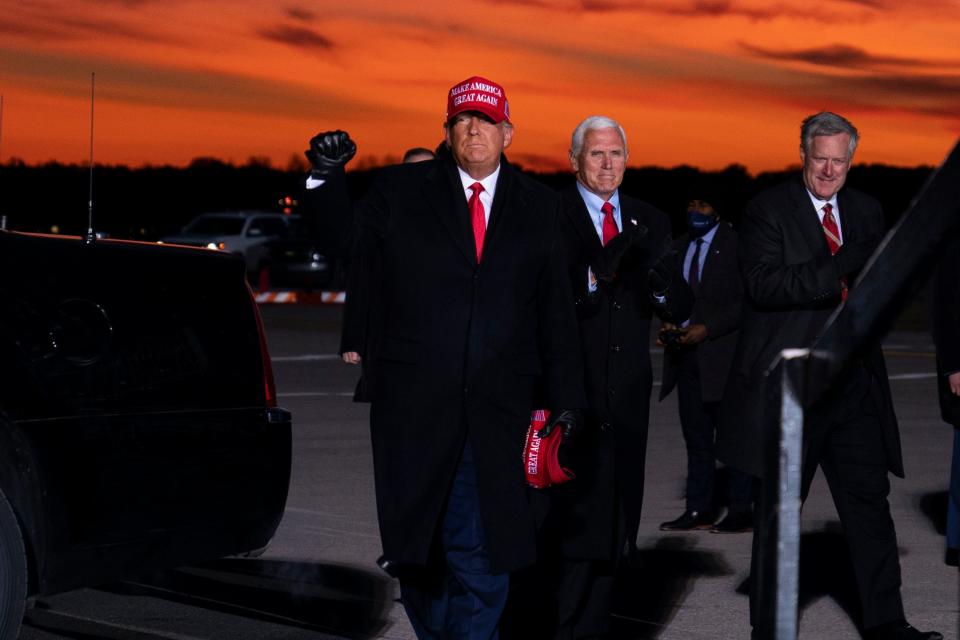‘Cross that bridge when we get to it’: Will House GOP object to 2024 election results?
- Oops!Something went wrong.Please try again later.
- Oops!Something went wrong.Please try again later.
WASHINGTON − Just over one year from now, lawmakers will gather in the United States Capitol to witness the counting of electoral votes in the 2024 presidential election. The ritual that dates back nearly 140 years went awry on Jan. 6, 2021, when supporters of former President Donald Trump stormed the Capitol amid unsubstantiated claims of voter fraud.
Nearly 150 members of Congress voted to object to electoral votes from Arizona or Pennsylvania after the Capitol was cleared. Of those, 127 are still holding congressional seats.
To mark the third anniversary of the Jan. 6 attack, USA TODAY asked House GOP lawmakers if they would object to this year’s election results. USA TODAY reached 20 lawmakers out of the 220-member conference and contacted all other offices but did not receive responses. Those reached gave mixed responses, and most declined to say whether they would object to the 2024 results.
“I would never, without knowing what the facts are, agree to vote any way,” Rep. Beth Van Duyne, R-Texas, who voted to overturn the 2020 election results, told USA TODAY. “I think it’s important, it’s imperative … to be able to make sure that elections are constitutionally valid.”
Charlie Dent, a former Republican congressman who represented Pennsylvania from 2005 to 2018, said Congress' role in counting electoral votes was always "seen as a pro forma matter." But that may not be the case in a post-Jan. 6 world.
"The election's over, there's usually not a dispute about who won, and then you vote to certify regardless of which side of the aisle you're on. Now that's not a certainty anymore," Dent said.

Hesitancy from some lawmakers mirrors a widespread mistrust of U.S. election security among Trump supporters.
A USA TODAY/Suffolk University Poll released Thursday found that 52% of Trump supporters said they had no confidence that the results of the 2024 election would be accurately counted and reported. Only 7% said they were very confident.
Comparatively, 81% of supporters of President Joe Biden said they were very confident in the election's accuracy, and only 3% were not confident.
Some lawmakers, who mostly represent crucial swing districts, committed to certifying the 2024 election results no matter the result.
“Yes,” said Rep. Anthony D’Esposito, R-N.Y. “My colleagues and I on the House Administration Committee regularly monitor election processes across the nation, and I am confident the committee will continue engaging in vigorous oversight during the 2024 election cycle.”
Others declined to commit to a specific position, saying it was too soon to say whether they could confidently certify the results.
“We’ll cross that bridge when we get to it. But our job is to look at the election, make sure there's no anomalies, and obviously if there’s not, we certify the results,” said Rep. Andy Ogles, R-Tenn.
Several pointed to election security heading into the next election cycle, citing what they say were problems and inconsistencies in the 2020 election, despite evidence proving the contrary: that the 2020 elections were secure.
“You can’t use COVID as an excuse to take ballot by mail and make it (a) universal ballot, right? There’s been fraud in elections, and a lot of it deals with paper ballots,” said Rep. Troy Nehls, R-Texas.

‘Depends on the context’
Most House Republicans who spoke with USA TODAY said it was too early to commit to certifying the electoral votes in 2024 without objection.
“It just depends on the context,” said Rep. Greg Steube, R-Fla. “How do you answer that when you don’t know all of the context of what may go down?”
Rep. Andy Biggs, R-Ariz., told USA TODAY that he will analyze the results of the 2024 election and then make a decision on whether he would certify.
“We don't even make the determination until we see how the election is done,” he said.
“I’m not going to commit to any hypothetical future,” Rep. Eric Burlison, R-Mo., told USA TODAY before the holiday recess.
Some House Republicans polled were clearer that their commitment to certifying the election results wouldn't waver.
“Yeah. Absent evidence of outright fraud, absolutely,” said Rep. Mike Flood, R-Neb.
“How I voted in 2021 speaks for itself. The Constitution is clear that states determine their own election policies,” said Nebraska Rep. Don Bacon, who voted against overturning the 2020 results. “I prefer to keep Congress out of Nebraska’s election laws.”
Rep. Lauren Boebert, R-Colo., who voted to overturn the 2020 election results, told USA TODAY she can’t commit to certifying the 2024 election results without objection with more than 300 days to go before Election Day.
“If I see that there is widespread fraud like I saw in the 2020 election, then absolutely I will not vote to certify,” Boebert said. “If there isn't, then I don't see a problem with it.”
There is no evidence supporting claims of large-scale voter fraud in the 2020 election, and allegations pushed by Trump's legal team were rejected for lack of merit by dozens of courts, Republican officials at the state and local level, and multiple firms hired by Trump's own campaign to look into fraud.

Boebert pointed to election security policies she’d like to see in 2024 to be confident in certifying the results.
“We have rogue judges, secretaries of states, attorney generals, changing election law without the state legislature,” she said.
Rep. Annie Kuster, D-N.H., told USA TODAY it was disappointing her GOP colleagues demurred over the counting of the 2024 election results and argued it was a "serious risk" to democracy.
Kuster was one of the last members evacuated from the House chamber as the pro-Trump mob trickled into the Capitol. Newly released security footage from the breach shows rioters trying to enter the chamber just 30 seconds after she escaped.
They were "essentially hunting members of Congress" over the election results, Kuster said. For members to be so reticent about 2024 and its potential aftermath, she said, is "very troubling."
A history of objections
Members of Congress have objected to election results several times in the past 50 years, most recently in 2017, when Democrats objected to Trump’s 2016 win.
At the time, then-Vice President Joe Biden presided over the joint session. Several House Democrats unsuccessfully raised objections to electoral votes from several states, citing voter suppression and Russian interference.
At the time no Democratic senator objected, a requirement to further the process of challenging the results. The same situation occurred in 2001 when several House Democrats planned to object to electoral votes but did not have a senator to join them.
Dent recalled objections from his Democratic colleagues during the certification of the 2004 electoral votes when Democrats contested the results of Ohio's election, pointing to allegations of disenfranchisement of Black voters and other irregularities in election administration.
"I thought it was undemocratic," Dent said of the objections. "We've had these situations in the past, when people don't want to accept an outcome ... most recently and most egregiously for Biden. So this is not a new phenomenon."
The widespread Republican move to object to election results in 2021, however, was unprecedented because Trump was unwilling to concede the race, Dent said.
"The answer should be yes, I'm going to certify the election − operating on the assumption that there's a clear winner by each of the 50 states. They tally their votes, the states certify their votes, they send them to Washington, and Washington certifies. It's not complicated."
How does the electoral count process work?
Once each state certifies the electoral votes, Congress meets for a joint session on Jan. 6 to count them. A presidential nominee must receive at least 270 out of 538 of the electoral votes to become the next president.
The Electoral Count Act, first passed in 1887, outlines the procedures if there are any objections by members of Congress to the electoral votes.
At the time of the Jan. 6 attack, a combination of one senator and one House member was required to object to a state’s count to trigger the process. If this occurred, as it did on Jan. 6, 2021, the joint session would be adjourned and each chamber would meet separately to debate the objection and hold separate votes to accept or reject a state’s count.
In 2021, House Republicans objected to the electoral votes from Arizona, Georgia, Michigan, Nevada and Pennsylvania. But senators rose to object to only two of those states – Arizona and Pennsylvania – triggering the process outlined in the Electoral Count Act.
As lawmakers returned to their separate chambers, pro-Trump rioters interrupted the process, forcing an emergency recess and evacuations. Eight Republican senators and 139 House Republicans supported the objections for both Arizona and Pennsylvania after Congress returned later that night – below the threshold needed to cast out the electoral votes from both states.
Congress passed the Electoral Count Reform Act two years later, which raised the threshold to debate a state’s electoral votes. Instead of one member from each chamber triggering debate on a state’s electoral votes, the process now requires one-fifth of each chamber to object.
This article originally appeared on USA TODAY: Will House GOP object to 2024 election results?

